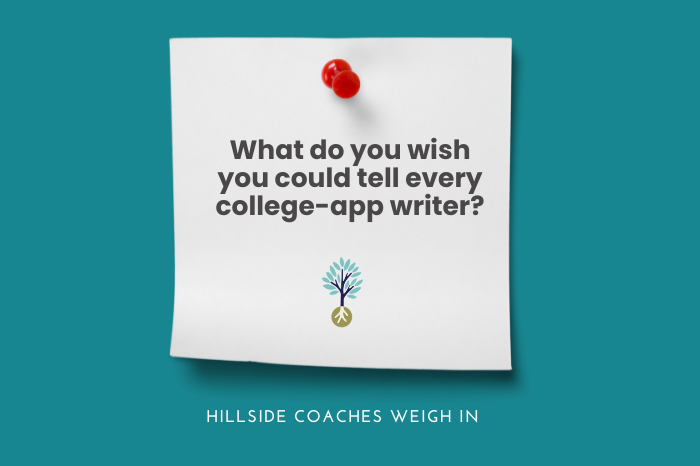As a Hillside coach, I read all sorts of “Two Cents From ‘Rents,” the responses that parents provide to our exploratory questions at the start of our Uncommon Essay Course for the college applicant. Sometimes I meet short poetic scenes or cogent and concise reflections, and other times I flow through single-spaced streams of consciousness.
This year, for the first time, I sat on the other side: when my daughter went through the application-essay-writing process, I was asked by her Hillside coach to give my parental Two Cents. I’m sure I could have generated tomes on my daughter’s experiences … and yet choosing which moments to include was a challenge. To move things along, my Coach Self had to remind my Parent Self of the reason for the exercise: no matter what I’d eventually write, my parental vantage point would be an important early step in my daughter’s essay-writing process.
One of the most helpful things that a parent can offer is context and perspective. The writers always know what is most meaningful to them — no one else can know that. But in most cases, a parent does have the ability to step back and provide a unique view of the child’s experience.
As a coach, I can tell you that what a parent writes never dictates the subject of a student’s essay. What the Two Cents can do, however, is prompt coaches to ask questions we might not otherwise know to ask. I remember one father mentioned his daughter’s experience working in a fast food restaurant, and it turned out that an interaction she’d had there was the perfect complement to an encounter she was already writing about. I don’t know that we would have unearthed that experience and therefore made that connection if her father hadn’t mentioned it. Another parent wrote about the impact of her daughter’s decision to switch from singles to doubles tennis, which at first glance seems like a small thing. But when I asked the student about it, we began a fun and substantive conversation about collaboration, an idea that eventually became key to her essay.
This isn’t to say that parents know what their child will find most compelling and relevant to write about. Sometimes it’s quite the opposite. One mother wrote about her son’s experience mowing their blind neighbor’s lawn and the ensuing friendship. That experience and friendship didn’t come up at all in my student’s Ten Sentences, and when I asked him about it, he rolled his eyes and said, “My mom ALWAYS wants me to write about that.” I agreed with his mother — I thought the experience had the potential for some interesting observations and writing material … but certainly not if it didn’t strike a chord with the student himself! What I look for when I work with students is that moment when they light up, even if in the smallest way, and then I’ll keep asking questions to see where we can go together. But if I ask about something that’s referenced in the Two Cents and there’s no spark, no glimmer of interest, we move on.
One of the most helpful things that a parent can offer is context and perspective. The writers always know what is most meaningful to them — no one else can know that. But in most cases, a parent does have the ability to step back and provide a unique view of the child’s experience. There are some benefits that come with age, after all! A student might off-handedly mention an after-school job or interesting class, and if the parent has provided backstory on that particular experience, we can find our way into some really useful conversations.
As a parent, I can tell you what my input meant to my own daughter’s essay-writing process. I wrote about plenty that didn’t make it into her discussion with her coach, but one line of mine certainly did: It might be worth asking her about getting over her nerves at swim meets, I wrote. She loves swim practice and has historically hated meets (the opposite of a lot of kids). Indeed, when she brought up her love of swimming during their conversations, her coach asked her about practices versus swim meets. This led to much deeper discussions, and eventually to the first line of her essay: I’m one of the few swimmers I know who likes practice more than competitive meets.
Hopefully, it’s a relief for parents to hand over to the coach for a few weeks the conversations that swirl around essay-writing. It certainly was for me. I knew my daughter’s Hillside coach would be as curious and eager to know my child as I am to find out about my own new students. We want to discover what really lights them up and makes them unique. So, parents: the writing you do in your Two Cents — no matter how long or short, how expressive or factual — helps provide a background that we simply wouldn’t otherwise have.
Eliza is a Hillside coach.




